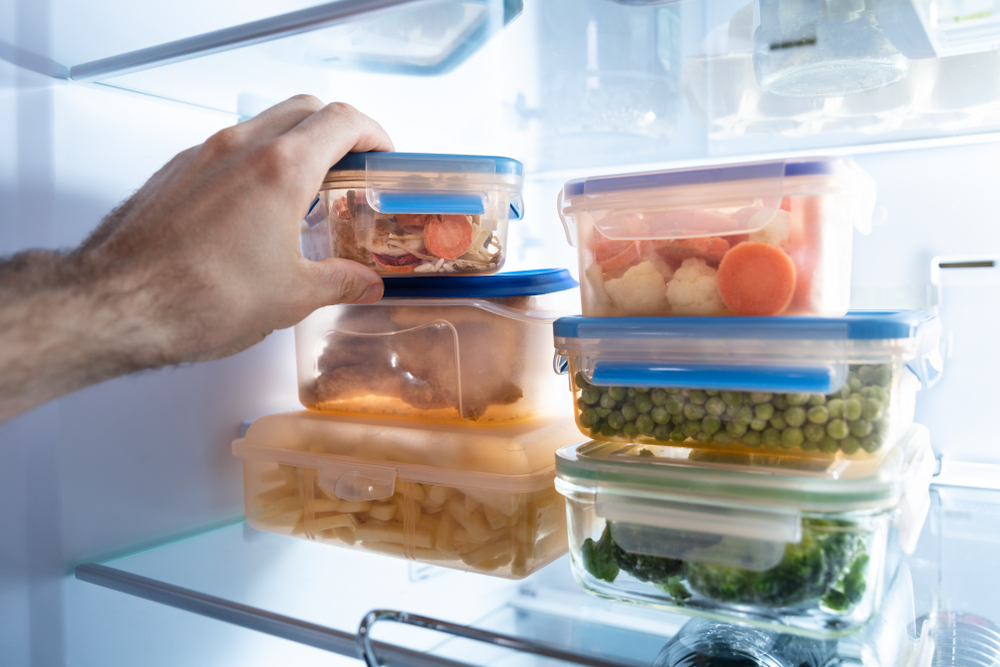Did you know that in Europe each person wastes on average 90 kg of food per year? Of this, about 65% is fresh food. One of the main causes of household waste is incorrect storage: improper refrigerator use, wrong freezing, or simple forgetfulness contribute to a lot of food ending up in the trash.
Better organization, separating foods, respecting expiry dates and timings, and choosing suitable containers allow food to stay fresh longer and save up to 65 kg of food per year.
How to store: time matters
Can I freeze a ready-made dish? How long can meat stay in the refrigerator? Is a container better than plastic wrap?
These are common doubts in everyday fridge management. Each food has specific properties and needs to be consumed within certain times.
Fruit and Vegetables
Fruit and vegetables keep well both in the refrigerator and freezer, but the duration depends on the type and ripeness. In general, they can last up to one week in the lower fridge drawer and up to 10 months in the freezer. Some tips:
- More delicate fruits, such as berries, and some leafy vegetables need to be eaten more quickly, within 2-3 days.
- Blanched vegetables or cut fruit can be frozen without problems.
- For optimal storage, avoid washing fruit and vegetables before eating to prevent mold. Micro-perforated bags are ideal to maintain the right humidity and preserve freshness and flavor.
Meat
Meat can pose some risks when it comes to storage. It’s important to distinguish between red and white meat, whether raw or cooked.
- Red meat can be stored up to 4 days in the fridge and 4 to 6 months in the freezer.
- White meat lasts about 3 days in the fridge and up to 3 months in the freezer if well portioned and wrapped in plastic wrap.
- Cooked meat can be stored for 1–2 days in the fridge and up to 3 months in the freezer, avoiding leaving it too long at room temperature.
Remember! Once thawed, meat should be consumed the same day, especially if defrosted at room temperature, in the microwave, or in water.
Fish
Fish requires special care to maintain freshness and organoleptic properties.
- Small fish, squid, or octopus should be eaten the same day.
- Crustaceans, shellfish, and larger cleaned fish can be kept up to 2 days in the fridge.
- Cooked fish can be stored in airtight containers and eaten the next day, avoiding freezing.
Fresh fish can be frozen for up to 3 months, while shellfish and small or fatty fish up to 1 month. To speed up freezing, adding a drop of water can be useful.
Dairy Products
The fridge is ideal for storing dairy products.
- Fresh milk can last 3–4 days after opening.
- Yogurt lasts for several weeks, depending on expiry dates.
- Fresh cheeses about 3 days if kept in their liquid or in airtight containers.
- Butter, once opened, can be stored up to 3 weeks if well sealed and protected from other odors.
For aged cheeses, it’s recommended to wrap them in breathable paper or baking paper to prevent mold and preserve flavor and texture.
Store Other food
- Eggs, depending on their expiry date, can be stored for several weeks. Only egg whites and yolks can be frozen separately: whites up to 12 months and beaten yolks for 3–4 months.
- Store ready-made dishes in the fridge for a few days, cooling them well and dividing them into portions.
- Herbs keep their aroma if stored 3–4 days in the fridge wrapped in damp paper, or in the freezer chopped or in ice cubes with oil.

Choose the right container to store food
Another important precaution to store food fresh longer and prevent contamination is to use the right container. There are various types:
- Airtight containers: ideal for meat, fish, and ready-made dishes. Discover the Care+Protect accessory range for fridge and freezer storage.
- Glass jars: perfect for preserves, sauces, or foods in oil.
- Plastic wrap: to protect moist foods, such as fruit and vegetables, from humidity, contamination, and odors.
- Aluminum foil: useful for storing dry or cooked dishes, but avoid salty or acidic ones.
- Breathable paper: great for maintaining a certain humidity level in fruit and vegetables.
- Freezer bags: useful for freezing meat and vegetables in portions, reducing the risk of freezer burn.
Some extra tips
Just a few simple tricks help preserve food better:
- Remove air from containers to slow bacterial growth.
- Keep the fridge clean for hygiene and efficiency.
- Apply the FIFO rule (First In, First Out) to consume older food first.
- Label containers or bags with storage dates to keep everything under control.
- Cool and portion food* before putting it in the fridge.
*It’s important to pay attention to two details: don’t let food reach room temperature but put it in the fridge earlier. Between 25° and 40°C the risk of bacterial growth increases. By speeding up cooling, the risk decreases even more: use a bowl of ice water for a few minutes.
hOn for smart storage
Simple measures are enough to store food properly and avoid wasting food, energy, and money.
In everyday life you won’t be alone anymore. The hOn app supports you in household management. Everything will be under control thanks to Smart Storage, hOn’s digital inventory to record and monitor expiry dates. You can check it anytime to really buy what you need and avoid unnecessary waste. hOn’s Smart Inventory keeps your food intelligently and warns you when it’s about to expire.
Do you want to organize your fridge optimally? The Food Locator suggests the ideal compartment for each food to store it at its best. Read our article on how to organise your refrigerator optimally.
If you haven’t already, download the hOn app, discover its features, and use them for smart management of your whole home.
See you in the next article!





